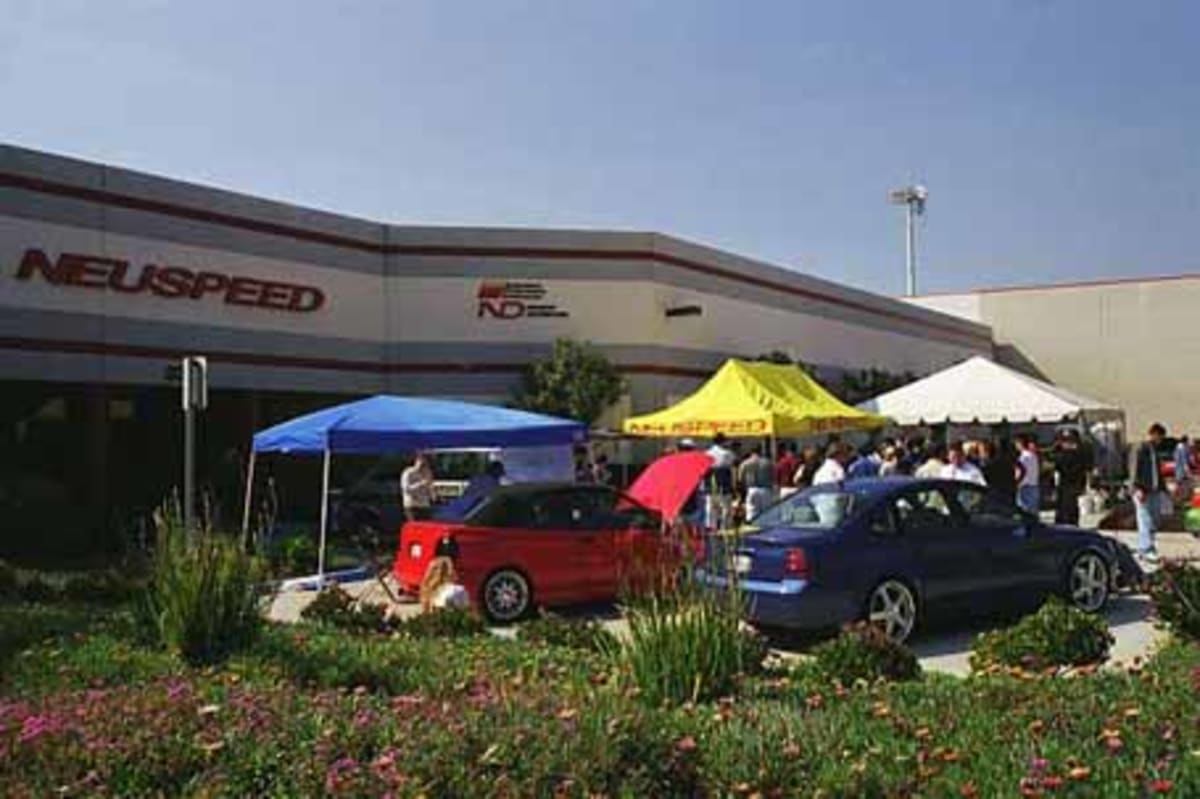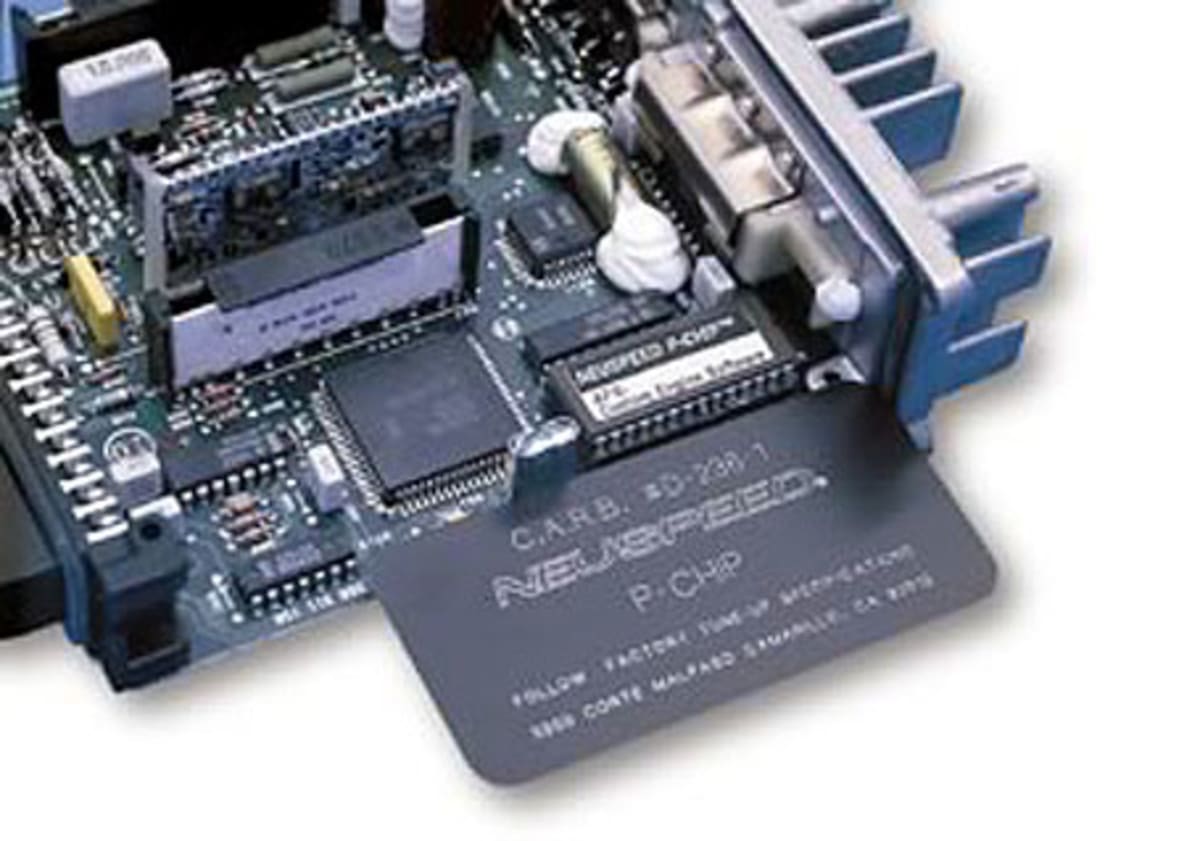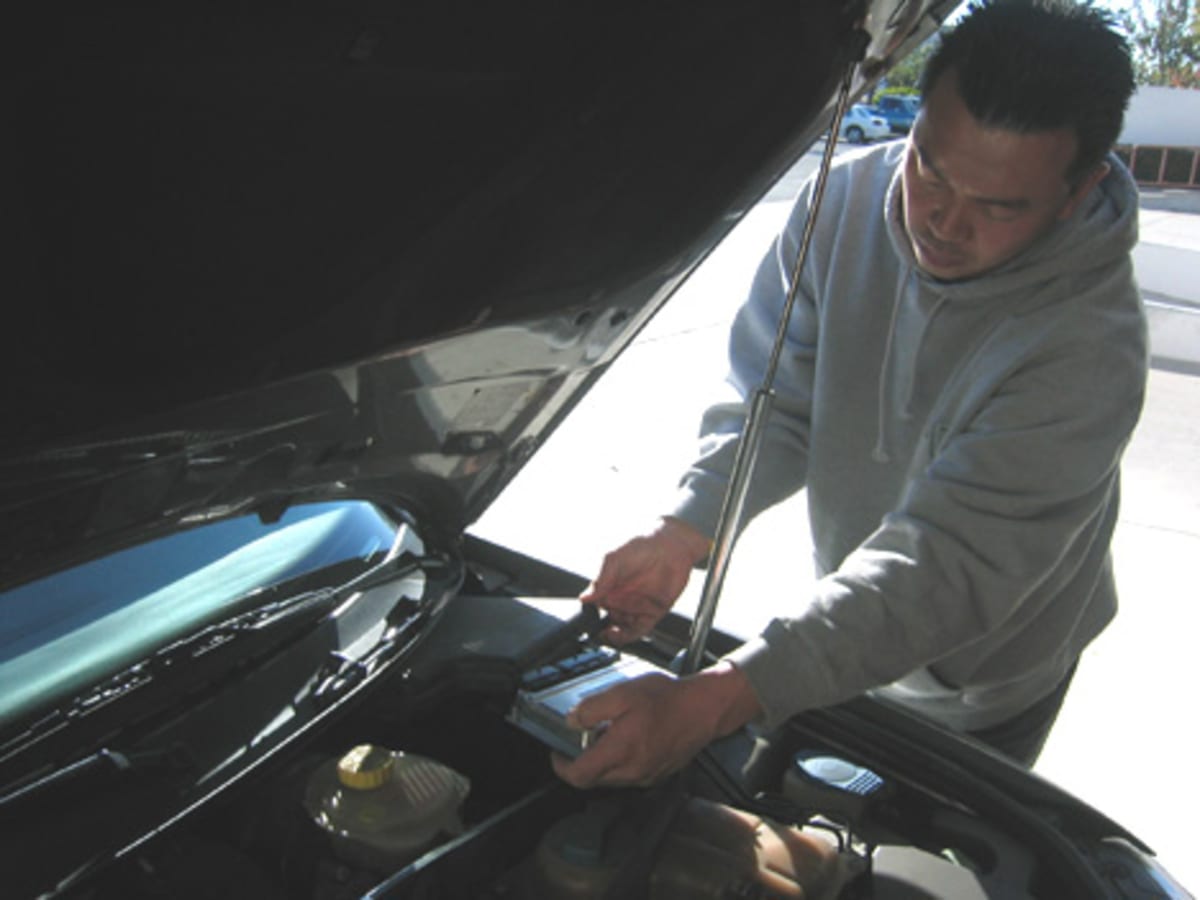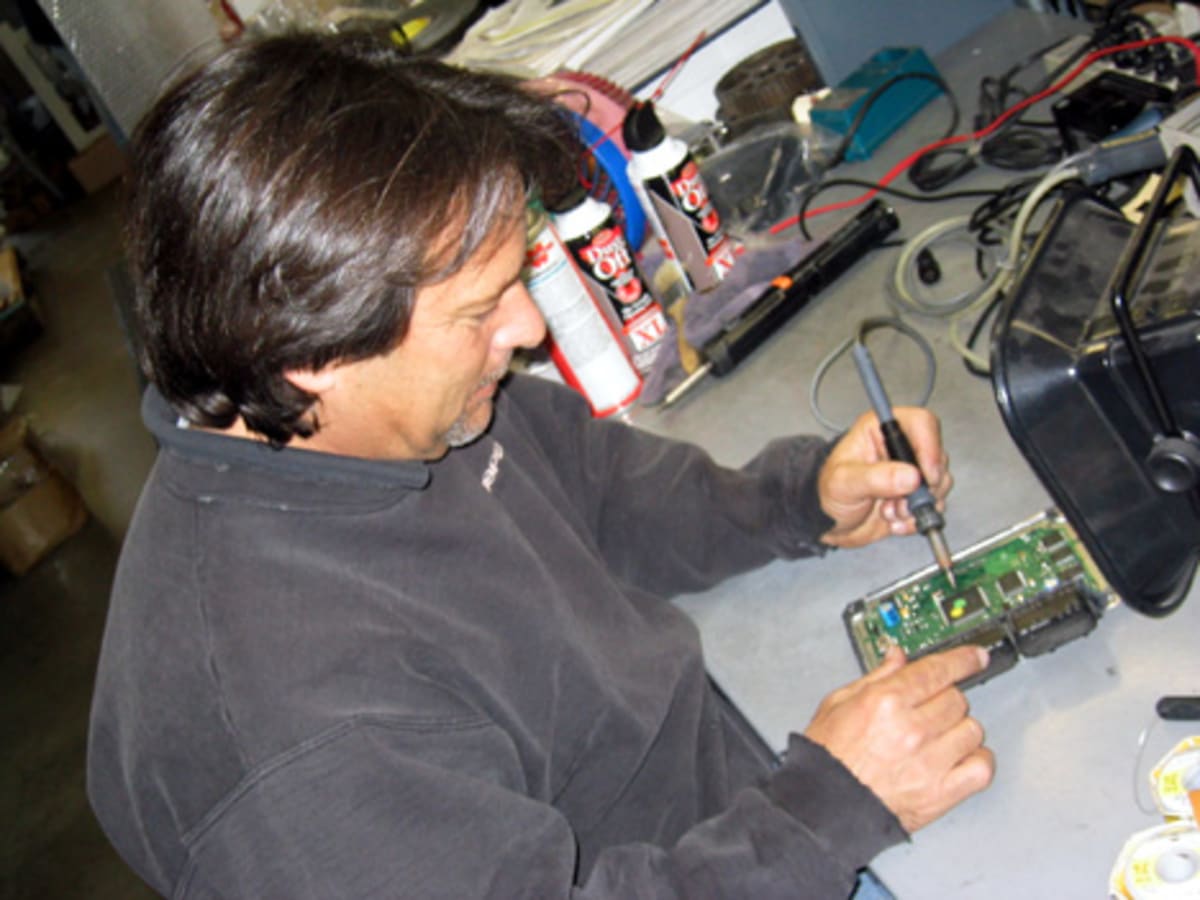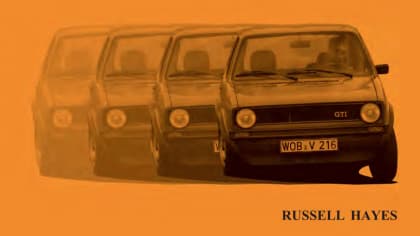HELLO, MISTER CHIPS
This article is from our archives and has not been updated and integrated with our "new" site yet... Even so, it's still awesome - so keep reading!
Published on Wed, Jun 11, 2003
By: The LACar Editorial Staff
HELLO, MISTER CHIPS
By ROY NAKANO
When Volkswagen-Audi's turbocharged four-cylinder 1.8-liter engine first arrived here back in the fall of 1997, it was heralded by Ward's Automotive as possibly the best four-cylinder engine in the world. Subsequently, it made their 10 Best Engines list for 1997, 1998, 2001, 2002, and 2003.
The foundation for this engine's strength lies in its cast iron block design,
with five valves per cylinder (three intake and two exhaust valves), and forged
steel crankshaft with five main bearings (even Volkswagen's 2.8 liter V6
fitted in the Passat only has four). The result is an extremely robust four-cylinder
engine, capable of output far beyond its factory settings. How far beyond, you
ask? VAGSport reports users running 1.8T engines over 400 crank horsepower with
totally stock blocks and engine internals. Helping to make all of this work
are dual belt-driven overhead camshafts (hollow-centered), a digital electronic
ignition system and Motronic ME7 sequential multi-point fuel injection.
The tuner crowd loves this engine for another reason: It's fitted with
an intercooled 3K-Warner K03 turbocharger. While the Audi TT can be optioned
with a double-intercooled, medium-pressure turbocharger 1.8T engine generating
225 horsepower, most VW-Audi applications of the 1.8T are light-pressure turbocharged
engines rated at 150-180 horsepower. The 1.8T engine is available in the Audi
A4 and TT, as well as in the Volkswagen New Beetle, Jetta, GTI, and Passat.
Unlike normally-aspirated engines, getting more horsepower out of an engine
with a turbocharger is relatively easy. In a turbocharged engine, the amount
of power generated can be controlled by the amount of turbo-boost pressure applied.
In most cases, this is a function of the vehicle's electronic control unit
(ECU). Thus, a simple modification to the ECU computer chip can result in a
dramatic increase in horsepower. In normally-aspirated vehicles, "upgrades"
to the ECU computer chip will yield little-to-no noticeable increase in power.
In a 1.8T-equipped vehicle, a simple chip modification can result in an increase
of 35-50 horsepower.
This fact has not gone unnoticed in the aftermarket performance community. Several
companies provide ECU modifications for the VW-Audi 1.8T engine: AMS (associated
with the German firm ABT), APR (a favorite among 1.8T tuners), AutoTech, AutoThority,
GIAC (a particular favorite among Volkswagen tuners), Hoppen (associated with
the German firm MTM), Neuspeed, Oettinger, TAP (Total Audi Performance), Upsolute
(one of the less expensive chip modifiers) and Wetterauer (a favorite among
Audi tuners), to name a few.
LA CAR went to Neuspeed in Camarillo, California to see what its engine management
chip upgrade can do for a B5.5 Volkswagen Passat fitted with the 1.8T engine.
We chose Neuspeed for a variety of reasons: It's one of the oldest and
most well-established aftermarket companies specializing in Volkswagen-Audi
products. It has a reputation for erring on the conservative side to maximize
drivability and durability. Last, but not least, its chips for the 1.8T are
among the least expensive in the industry ($199.95 for throttle-by-cable models,
typically 1997-1999 VW-Audi vehicles; $349.95 for drive-by-wire vehicles, typically
2000 and later vehicles). Neuspeed also boosts that its chips are among the
only ones approved by the California Air Resources Board.
For the B5.5, Neuspeed reprograms the ECU chip to increase turbo boost to approximately
1.1 bar (16 psi), optimize ignition timing under part throttle and full throttle
load, and raise the rev-limiter and top speed governor. Horsepower is conservatively estimated to increase by approximately 30-35 hp at the wheels. "In reality, the amount of
boost and horsepower increase varies a little, depending on the ECU used by Volkswagen at the time," says Neuspeed
Chief Engineer Aaron Neumann. Our vehicle was fitted with ECU No. 480906018CL, which
meant that boost could be brought up to as high as 1.5 bar, with horsepower increased from a stock 170 to 205-210 at the crankshaft. Even more impressive, torque is increased
from a stock 166 foot pounds to a whopping 225-235. To optimize drivability,
we stuck with the more reasonable 1.1 bar setting.
So, how does it feel? Like a completely different car. There's not that
much difference at the low end. As the tachometer needle swings into the upper
2000 rpm range, however, the power hits like a velvet glove - and it keeps
on pulling well into the high end of the rpm spectrum. The Passat is transformed
from a nice family sedan to a rip roaring sports sedan. Inducing tire smoke
from a rolling start is not hard to do (with the traction control disengaged).
The torque curve is reminiscent of the 250 hp Saab 9-5 Aero, which is mostly
a good thing.
On the down side, the turbo lag - that inherent tendency of turbocharged
engines to delay power delivery (particularly from a standing start) -
is a bit more noticeable. The 1.8T was designed from the ground up to minimize turbo
lag. Its long stroke and small bore configuration, coupled with its built-in
by-pass valve on the compressor side of the turbocharger (which keeps the turbo
spinning at idle and deceleration), does a good job of keeping the perception
of turbo lag to a minimum. Thus, maximum torque on a stock 1.8T Passat comes
on at an early 1950 rpm. However, with the quantum increase in midrange and
high-end torque, the low end of the rpm spectrum comes up noticeably short.
The turbo lag is more noticeable on automatic transmissions. Using the Tiptronic
(manual-matic) function minimizes the problem, but it does mean that a "chipped"
car is more finicky about being in the right gear. Of course, with a true manual
transmission, this problem is further minimized. However, those who prefer to
keep their automatics in "drive" may find a chipped 1.8T's power
lunges (as the rpms swing upward) a bit annoying. For those who don't mind
working the gears, however, a chipped 1.8T is a blast to drive and has great
entertainment value in-and-out of traffic.
Neuspeed's Randy Kaneko pulling the chip unit from our Passat
The art of chipping has taken the VW-Audi tuner community by storm. Keith Buglewicz
of VW Power magazine wrote back in the late 1990s, "Your $400-700 would
pay for a new exhaust system, intake system and header for a Civic. Six or seven
hours later, the Civic would be churning out about 10 extra horses...if you're
lucky. On the other hand, for the same money, in about ten minutes total (including
the time it takes to open and close the hood) a new Golf [1.8T with a modified
will be pumping out almost 200 horsepower and absolutely run circles around
the Civic."
Volkswagen of America is not entirely happy about the proliferation of aftermarket chips.
Accordingly, they have taken the position that an aftermarket chip can void
the car maker's warranty. Despite the robust design of the 1.8T engine
itself, the turbocharger can suffer failure. Although turbo failure appears
to be a relatively rare occurrence within the warranty period, chipping does
add stress to the turbo, and can add stress to other power train components
such as the transmission.
The Specialty Market Equipment Association - the trade association and
lobbying group representing the aftermarket business community - takes
the position that the car maker's warranty cannot be voided due to an aftermarket
modification, unless a dealer is able to prove that the modification caused
the failure of a stock engine component. If this occurs, then SEMA argues that
the dealer can only deny a warranty on that specific failed component, not void
the entire warranty.
Some dealers have been known to be "chip friendly" (some are authorized
aftermarket performance retailers), despite the pressure from Volkswagen
and Audi headquarters to watch for warranty lapses. MotoMannequin, a member of the popular
Internet board, 20VTurbo.com, offered an interesting viewpoint on the issue
of turbo failure. "The problem is in one's perspective. A turbo failure is not a 'failure' so much as it is an 'opportunity to upgrade.' Every time I hear that turbo spool, I know I'm that much closer to a (bigger and stronger) K04 or T3/T4 turbo!"
chip
Recommended Reading:
Chip Tuners, by Bob Vernon, ClubB5. Includes a good primer on chip tuning, and a list of chip modifiers and how to contact them
Chipped 1.8T Durability, by Martin L, VAGSport.
Warranty Denied?, Specialty Equipment Market Association.
LA CAR's review of the Volkswagen Passat
More information about Neuspeed products can be found at www.neuspeed.com

